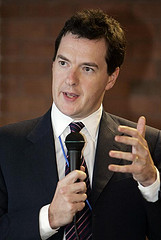Disappointed reaction to “greenest government” budget
Green campaign groups react negatively to George Osborne’s latest budget and there is particular concern for the muted powers of the Coalition’s much talked up Green Investment Bank. Chris Huhne, Secretary of State for DECC, however, feels it sends out a strong and clear message to energy investors.

 The UK Coalition government promised to be the “greenest government ever” when they came to power last year. Reactions from environmental organisations to their latest budget do not match the government’s confidence in their green credentials.
The UK Coalition government promised to be the “greenest government ever” when they came to power last year. Reactions from environmental organisations to their latest budget do not match the government’s confidence in their green credentials.
The eagerly anticipated Green Investment Bank (GIB) had further clarification from Chancellor of the Exchequer, George Osborne (23 March) – it will be funded by £1 billion from taxpayers and a further £2 billion from the sale of government assets.
Crucially, however, the GIB will not be able to borrow money until 2015 despite a launch date in 2012, preventing it from being effectively a private, independent institution.
Andy Atkins, Friends of the Earth’s Executive Director, hoped the GIB would be the vehicle to drive economic recovery but is no longer so confident.
He said: “By delaying the bank's borrowing powers the Treasury has sneaked round the back of the motor and siphoned off the fuel - just as the rest of Government is firing up the ignition”.
Before the budget, Greenpeace UK called for the GIB to be state backed, “to provide confidence for private investment and to taxpayers that the public funds will be used wisely.”
Currently concern seems to be that much of the GIB’s powers will be dulled and no longer be able to drive the UK economy forward.
Greenpeace UK’s Executive Director, John Sauven, said: “There's almost nothing in this Budget to protect the environment and spark a clean-tech jobs boom.”
Chris Huhne, Secretary for Energy and Climate Change, has however, responded positively to the Budget. He said: “There’s a clear, long term signal to energy investors in today’s Budget.
“A Green Investment Bank with substantially more capital and borrowing capacity and a stronger, more stable carbon price put investment in green energy technologies at the heart of the coalition’s strategy for sustainable, balanced economic growth.”
The government is introducing a carbon floor price for power generation from 2013 starting at £16 per tonne.
This price will rise to £30 by 2020 in the hopes of driving investment in the low carbon sector by making the price of pollution high.
As expected, Osborne earmarked £1 billion for the development of a pilot carbon capture and storage (CCS) project but this funding will no longer come from a levy on energy bills but general taxation.
So CCS will be funded but there is now no guarantee of where the money will come from exactly and still no time frame for when the project will start.
Dr Richard Dixon, Director of WWF Scotland, is critical of this uncertainty, “it is hard to see international companies thinking the UK is the place to come and make this vital technology work.”
But in tough economic times, some help will come from scrapping the energy bills levy, removing the escalator mechanism on fuel duty and implementing a cut in fuel tax.
Transport firms and businesses with high transport budgets will surely be pleased with this decision but it does remove some incentives to look at alternative fuels and energy sources for corporate fleets, something that will be essential looking forward as climate change worsens and resources dwindle.
Friends of the Earth’s transport campaigner, Richard Dyer, feels that tax cuts are not the solution to rising oil prices.
"If we want to protect people from future price hikes we need a fresh approach based on smarter cars that use less fuel, better public transport and more walking and cycling for shorter journeys.”
Front page image: markhillary | Flickr
Body image: Alan Dean | Flickr


_400_250_80_s_c1.jpg)



